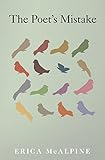The Poet's Mistake / Erica McAlpine.
Material type: TextPublisher: Princeton, NJ : Princeton University Press, [2020]Copyright date: ©2020Description: 1 online resource (297 p.)Content type:
TextPublisher: Princeton, NJ : Princeton University Press, [2020]Copyright date: ©2020Description: 1 online resource (297 p.)Content type: - 9780691203492
- 9780691203768
- American poetry -- History and criticism
- English poetry -- History and cricitism
- Errors and blunders, Literary -- History
- Errors and blunders, Literary
- Poetry -- Authorship
- LITERARY CRITICISM / Poetry
- Anxiety of Influence
- Christopher Ricks
- Elizabeth Bishop
- Emily Dickinson
- Force of Poetry
- Frank Kermode
- Geoffrey Hill
- Harold Bloom
- Hart Crane
- John Ashbery
- John Clare
- John Fuller
- John Keats
- John Sutherland
- Literature and Matters of Fact
- Michael Anesko
- Nerys Williams
- Paul Muldoon
- Robert Browning
- Romantic poetry
- Seamus Heaney
- Seth Lerer
- Uses of Error
- Who Framed Elizabeth Bennet
- Who is Ozymandias
- William Wordsworth
- contemporary poetry
- errors
- literary criticism
- literary history
- misprision
- modernist poetry
- poetry criticism
- typos
- 808.1 23
- PR508
- online - DeGruyter
| Item type | Current library | Call number | URL | Status | Notes | Barcode | |
|---|---|---|---|---|---|---|---|
 eBook
eBook
|
Biblioteca "Angelicum" Pont. Univ. S.Tommaso d'Aquino Nuvola online | online - DeGruyter (Browse shelf(Opens below)) | Online access | Not for loan (Accesso limitato) | Accesso per gli utenti autorizzati / Access for authorized users | (dgr)9780691203768 |
Frontmatter -- Contents -- Preface -- Acknowledgments -- Introduction. The Poet’s Mistake -- Chapter 1. Wordsworth’s Imperfect Perfect -- Chapter 2. Robert Browning’s Bad Habit -- Chapter 3. Wondering about John Clare -- Chapter 4. Emily Dickinson’s Eloquent Lies -- Chapter 5. Hart Crane’s Wrapture -- Chapter 6. Fact-Checking Elizabeth Bishop -- Chapter 7. Misremembering Seamus Heaney -- Conclusion. Mistaking on Purpose -- Notes -- Works Cited -- Index
restricted access online access with authorization star
http://purl.org/coar/access_right/c_16ec
What our tendency to justify the mistakes in poems reveals about our faith in poetry—and about how we readKeats mixed up Cortez and Balboa. Heaney misremembered the name of one of Wordsworth's lakes. Poetry—even by the greats—is rife with mistakes. In The Poet's Mistake, critic and poet Erica McAlpine gathers together for the first time numerous instances of these errors, from well-known historical gaffes to never-before-noticed grammatical incongruities, misspellings, and solecisms. But unlike the many critics and other readers who consider such errors felicitous or essential to the work itself, she makes a compelling case for calling a mistake a mistake, arguing that denying the possibility of error does a disservice to poets and their poems.Tracing the temptation to justify poets' errors from Aristotle through Freud, McAlpine demonstrates that the study of poetry's mistakes is also a study of critical attitudes toward mistakes, which are usually too generous—and often at the expense of the poet's intentions. Through remarkable close readings of Wordsworth, Keats, Browning, Clare, Dickinson, Crane, Bishop, Heaney, Ashbery, and others, The Poet's Mistake shows that errors are an inevitable part of poetry's making and that our responses to them reveal a great deal about our faith in poetry—and about how we read.
Mode of access: Internet via World Wide Web.
In English.
Description based on online resource; title from PDF title page (publisher's Web site, viewed 25. Jun 2024)


